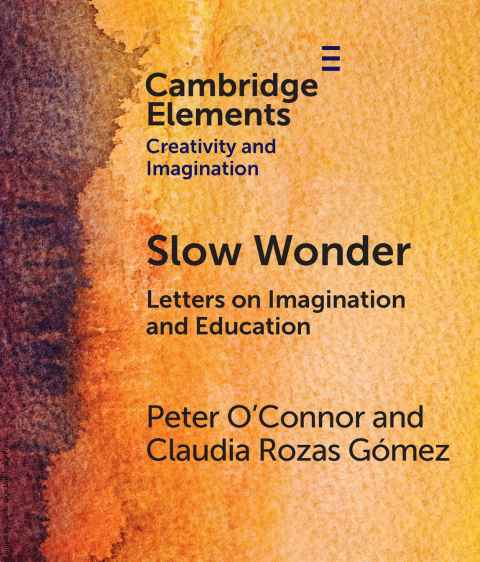Experts adopt creative approach to question contemporary education
1 April 2023
Professor Peter O'Connor and Dr Claudia Rozas Gómez bounce ideas about education back and forth in a series of letters.

A series of letters between two thoughtful educators counters the idea of learning being a race in which you dare not fall behind.
Slow Wonder: Letters on Imagination and Education is written by Professor Peter O’Connor and Dr Claudia Rozas Gómez from the University’s Faculty of Education and Social Work. It playfully imagines alternatives to current ways of thinking about education, especially in its focus on the transactional and functional, says Peter, an expert on arts education.
“Everything is jammed in for learning this and learning that, which can strip away the human qualities of relationship building,” says Peter.
As well as emailed letters between Peter and Claudia, and those they’ve written to others, the book features reflective musings in the form of poetry, and even a contrapuntal poem written by Claudia in response to, and intertwined with, Peter’s original poem.
Claudia, who has a background in educational sociology and teaching, says she’d enjoyed working with Peter on a previous book, Playing with Possibilities (2017), which is where the ‘slow wonder’ idea emerged and then stayed with them both.
“It became a deeply compelling, seductive idea,” says Claudia. “It spoke against the contemporary university in lots of ways, as well as contemporary ideas about education.
“Everything is speeding up, and we’re in this era of fast capitalism, fast production, fast consumption; so ‘slow wonder’ was the opposite. It offered a kind of gentle dawdle. We thought, ‘What if we just float on the surface with this notion and see what happens?’”
The result was a mutual search for new things to believe in, she says. “There is an existential element to what’s happening where we’re reckoning with our everyday lives in the University, and within education.
“I don’t think it’s hyperbole to say that the work of academia is to contribute to a conversation that never ends, and letters leant themselves to that. They are personal, whimsical, enraged, righteous; all those things that are normal, good and right for human beings to be.”
We challenge the idea that you should always be working towards something that’s predetermined.
The correspondence became a bit like a tennis match, says Peter.
“I would lob something over and Claudia would volley it back and take the idea somewhere else. Claudia pushed my writing. She works with an internal editor, whereas I can be a bit scattergun and shoot from the hip. Claudia fought for elegance in every sentence.”
Writing during Covid lockdowns affected both the conditions for writing, in that they had to connect on Zoom or write outside, as well as the content and its sense of hopefulness.
“There was this idea that when we came out of Covid, we would do things differently, and maybe better,” says Peter.
Although it turns out, they admit, that we are mostly doing things the same.
One of Claudia’s letters features the remarkable story of her great-grandmother Albina.
“She had an arranged marriage at around 13 or 14 with an older man, then ran away from him to the town where my family is from, in the north of Chile. She was widowed, then a son and daughter died, so she brought up all her grandchildren, including my mother.”
Claudia says Albina always wanted “to die in the middle of the street so people would have to come and look for her” and that’s exactly what happened.
“I use the story to talk about the importance of relationships. In a small town, everyone would have known someone who knew her; I make that connection to our own relationship with the academy and within education.”
We ask what might’ve been lost by being so overstructured? We’re seeking those gaps and spaces.
As well as the value of relationships and slowing down to pay attention and better appreciate things, the letters discuss magic, beauty and imagination.
“Imagination can be a site of resistance, one way to fight back against the orthodoxies,” says Peter.
“We thought we should imagine something else if we don’t like what we’ve got,” says Claudia. “We challenge the idea that you should always be working towards something that’s predetermined.
“What if we’re just surprised, what if we don’t know? That seems like such an important element in education; anything else seems like ‘anti-education’: to know everything before you start.”
Peter says they’re not so much throwing everything out as asking what could be better.
“To go back to [American philosopher and educational reformer] John Dewey, famous for the quote, ‘Education is not preparation for life; education is life itself’ we debate what we believe rather than what we know.
“We believe in structured spontaneity; you can still have structure and discipline and knowledge in a classroom, but we ask what might’ve been lost by being so overstructured? We’re seeking those gaps and spaces.”
Peter says the book “is full of their love of teaching and education”, despite their disenchantment with aspects of it, and Claudia agrees.
As she writes in her final letter: “We are in an ongoing relationship with education. That is why I tell students that teaching should be a love affair they never forget, or a puzzle they never learn to solve. Education’s state of always becoming is the end game.
“We should be glad for the wrestling because it means we are still engaged. Sometimes all we can do is stand back and look on, and trust the thread will hold. Wonder is the thread that stops us from giving up or surrendering to cynicism.”
Julianne Evans

This story first appeared in UniNews April 2023.